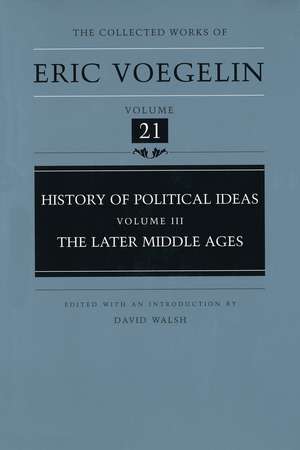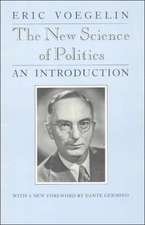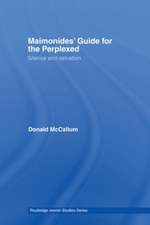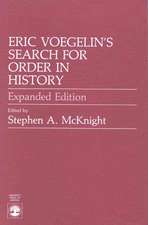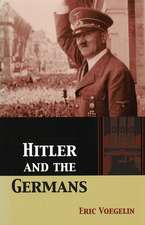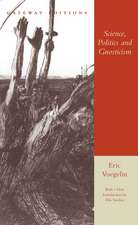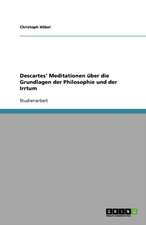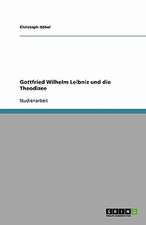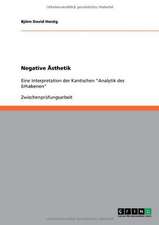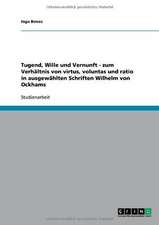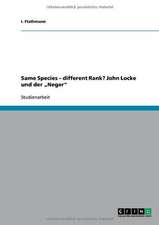History of Political Ideas, Volume 3 (CW21): The Later Middle Ages: The Collected Works of Eric Voegelin, cartea 21
Autor Eric Voegelin Editat de David Walshen Limba Engleză Hardback – 24 iun 1998 – vârsta ani
In The Later Middle Ages, the third volume of his monumental History of Political Ideas, Eric Voegelin continues his exploration of one of the most crucial periods in the history of political thought. Illuminating the great figures of the high Middle Ages, Voegelin traces the historical momentum of our modern world in the core evocative symbols that constituted medieval civilization. These symbols revolved around the enduring aspiration for the sacrum imperium, the one order capable of embracing the transcendent and immanent, the ecclesiastical and political, the divine and human. The story of the later Middle Ages is that of the "civilizational schism"—the movement in which not only the reality but the aspiration for the sacrum imperium gradually disappeared and the unification of faith and reason dissolved.
His recognition of this civilizational schism provides Voegelin with a unique perspective on medieval society. William of Ockham, Dante, Giles of Rome, and Marsilius of Padua all emerge in Voegelin's study as predecessors to modern thought; each turns to personal authority and intellectual analysis in an attempt to comprehend the loss of the sacrum imperium as an authoritative ideal. Voegelin is further drawn into investigations that, despite insufficient attention by scholars, still bear relevance to the study of the later Middle Ages. The mysticism apparent in Piers Plowman and the apocalyptic revolt of Cola di Rienzo are merely two reactions to the disintegration of wholeness.
Yet the story of the later Middle Ages does not merely revolve around disintegration. Voegelin recognizes the emergence of the constitutional political tradition as the most positive development of this period. He is at his best when explaining the difference between the presence of a representative institution and the growth of communal consciousness. Voegelin's study of the English political pattern is matched only by his unique perspective on the German imperial zone, culminating in a fitting conclusion on Nicholas of Cusa—the one political thinker with the ability to evoke the unity of mankind beyond fragmentation.
The Later Middle Ages is at once a brilliant examination of the symbols that characterized medieval society and a remarkable predecessor to Voegelin's study of the modern world, beginning with the Renaissance and the Reformation.
His recognition of this civilizational schism provides Voegelin with a unique perspective on medieval society. William of Ockham, Dante, Giles of Rome, and Marsilius of Padua all emerge in Voegelin's study as predecessors to modern thought; each turns to personal authority and intellectual analysis in an attempt to comprehend the loss of the sacrum imperium as an authoritative ideal. Voegelin is further drawn into investigations that, despite insufficient attention by scholars, still bear relevance to the study of the later Middle Ages. The mysticism apparent in Piers Plowman and the apocalyptic revolt of Cola di Rienzo are merely two reactions to the disintegration of wholeness.
Yet the story of the later Middle Ages does not merely revolve around disintegration. Voegelin recognizes the emergence of the constitutional political tradition as the most positive development of this period. He is at his best when explaining the difference between the presence of a representative institution and the growth of communal consciousness. Voegelin's study of the English political pattern is matched only by his unique perspective on the German imperial zone, culminating in a fitting conclusion on Nicholas of Cusa—the one political thinker with the ability to evoke the unity of mankind beyond fragmentation.
The Later Middle Ages is at once a brilliant examination of the symbols that characterized medieval society and a remarkable predecessor to Voegelin's study of the modern world, beginning with the Renaissance and the Reformation.
Din seria The Collected Works of Eric Voegelin
- 15%
 Preț: 471.63 lei
Preț: 471.63 lei - 15%
 Preț: 427.30 lei
Preț: 427.30 lei -
 Preț: 263.45 lei
Preț: 263.45 lei - 15%
 Preț: 555.49 lei
Preț: 555.49 lei - 15%
 Preț: 516.57 lei
Preț: 516.57 lei - 15%
 Preț: 480.26 lei
Preț: 480.26 lei - 15%
 Preț: 480.86 lei
Preț: 480.86 lei -
 Preț: 373.28 lei
Preț: 373.28 lei - 15%
 Preț: 398.94 lei
Preț: 398.94 lei - 15%
 Preț: 437.39 lei
Preț: 437.39 lei - 15%
 Preț: 478.30 lei
Preț: 478.30 lei - 15%
 Preț: 389.70 lei
Preț: 389.70 lei - 13%
 Preț: 346.67 lei
Preț: 346.67 lei - 14%
 Preț: 321.68 lei
Preț: 321.68 lei - 31%
 Preț: 347.59 lei
Preț: 347.59 lei - 31%
 Preț: 347.99 lei
Preț: 347.99 lei - 31%
 Preț: 347.99 lei
Preț: 347.99 lei - 25%
 Preț: 381.83 lei
Preț: 381.83 lei - 25%
 Preț: 382.82 lei
Preț: 382.82 lei
Preț: 428.67 lei
Preț vechi: 504.32 lei
-15% Nou
Puncte Express: 643
Preț estimativ în valută:
82.04€ • 85.33$ • 67.73£
82.04€ • 85.33$ • 67.73£
Carte disponibilă
Livrare economică 25 martie-08 aprilie
Livrare express 08-14 martie pentru 37.12 lei
Preluare comenzi: 021 569.72.76
Specificații
ISBN-13: 9780826211545
ISBN-10: 0826211542
Pagini: 296
Dimensiuni: 152 x 229 x 30 mm
Greutate: 0.69 kg
Ediția:First Edition
Editura: University of Missouri Press
Colecția University of Missouri
Seria The Collected Works of Eric Voegelin
ISBN-10: 0826211542
Pagini: 296
Dimensiuni: 152 x 229 x 30 mm
Greutate: 0.69 kg
Ediția:First Edition
Editura: University of Missouri Press
Colecția University of Missouri
Seria The Collected Works of Eric Voegelin
Notă biografică
About the Author
Eric Voegelin (1901-1985) was one of the most original and influential philosophers of our time. Born in Cologne, Germany, he studied at the University of Vienna, where he became a professor of political science in the Faculty of Law. In 1938, he and his wife, fleeing Hitler, emigrated to the United States. They became American citizens in 1944. Voegelin spent much of his career at Louisiana State University, the University of Munich, and the Hoover Institution at Stanford University. During his lifetime he published many books and more than one hundred articles. The Collected Works of Eric Voegelin will make available in a uniform edition all of Voegelin's major writings.
About the Editor David Walsh is Professor of Politics at the Catholic University of America in Washington, D.C. He is the author of The Growth of the Liberal Soul and After Ideology: Recovering the Spiritual Foundations of Freedom.
About the Editor David Walsh is Professor of Politics at the Catholic University of America in Washington, D.C. He is the author of The Growth of the Liberal Soul and After Ideology: Recovering the Spiritual Foundations of Freedom.
